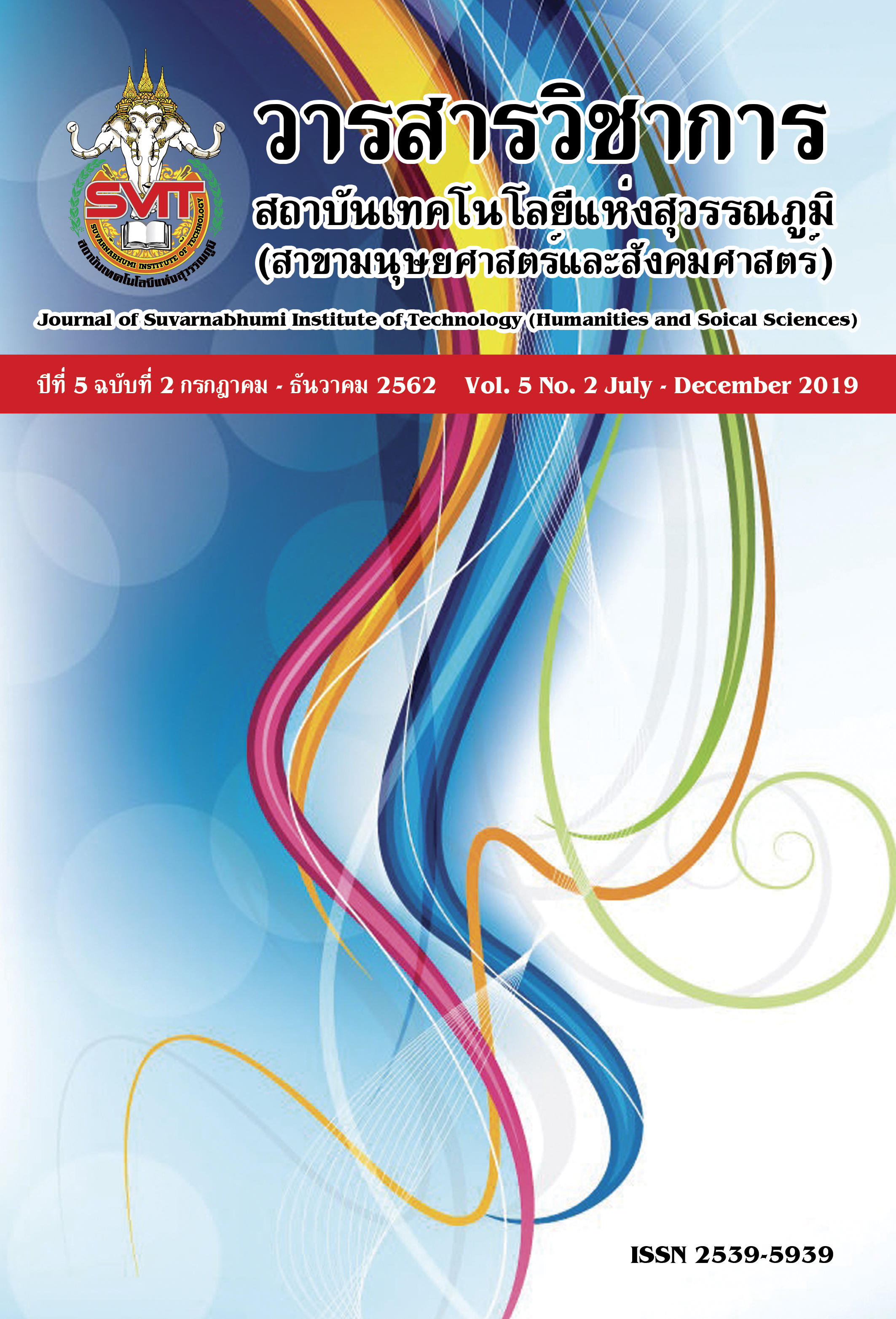THE CAPABILITY DEVELOPMENT MODEL FOR LECTURERS PROMOTING TO EXECUTIVE POSITION IN RAJAMANGALA UNIVERSITY OF TECHNOLOGY IN THE CENTRAL REGION
Keywords:
Model, Capability Development for Lecturers, Promoting Executive Position, Rajamangala University Of Technology In The Central RegionAbstract
In this dissertation, the researcher examines (1) the conditions of and the problems in the development of lecturers’ capabilities for holding executive positions at Rajamangala University of Technology in the Central Region. The researcher constructs (2) a capabilities development model for lecturers holding executive positions at this university. Finally, furthermore, the researcher evaluates (3) the model constructed. The research method is divided into three steps. Step One: The researcher studied the conditions of and the problems in lecturers developing capabilities for holding executive positions at the university under investigation. The sample population consisted of 15 subjects. Structured interviews served as the research instrument. The data collected were analyzed and synthesized using content analysis and thence a summary of frequencies. Step Two: The researcher constructed a lecturers’ capabilities development model for holding executive positions at the university under study using the Delphi method involving 17 experts for three rounds. The first round employed an open-ended questionnaire. The second and third rounds used a five-rating scale questionnaire. The data collected were analyzed in terms of median (Mdn) and interquartile range (IQR). Step Three: The model constructed by the researcher was evaluated through the agency of focus groups with nine experts serving as discussants. Discussion contents were analyzed and summarized by reference to issues involving model elements by means of content analysis
The results of the study were as follows:
- The development of the potential for lecturers promoting to executive position in rajamangala university of technology in the central region. A preparatory project was established for the development of executive capabilities with a supporting budget provided by internal and external agencies. Problems in developing the capabilities of lecturers. The number of those attending recruitment and selection meetings was minimal.
- The model constructed by the researcher consisted of four aspects: (1) recruitment and selection for executive positions; (2) the development of the capabilities of those selected for executive positions; (3) succession; and (4) the evaluation of those holding executive positions.
- In regard to the evaluation of the model constructed by the researcher, appropriate and feasible, the model after the process improvement consists of a development plan. Professors, potential development and evaluation.
From this study, it was found that it is important of planning in preparing for the development of the lecturers’ potential for holding the management of educational institutions in order to replace executive positions in the future.
References
ดำเนินธุรกิจระดับนานาชาติ. กรุงเทพมหานคร: สำนักพิมพ์แห่งจุฬาลงกรณ์มหาวิทยาลัย.
ชัยยนต์ เพาพาน. (2559). ผู้บริหารสถานศึกษายุคใหม่ในศตวรรษที่ 21. การประชุมวิชาการระดับชาติครุศาสตร์ ครั้งที่ 1. ค้นเมื่อ 20 ตุลาคม 2561, จาก https://conference.edu.ksu.ac.th /file/20160809_2488101126.pdf
โชติชวัล ฟูกิจกาญจน์. (2559). การพัฒนาทรัพยากรมนุษย์. กรุงเทพมหานคร: ซีเอ็ดยูเคชั่น.
ฐนันดร์ศักดิ์ บวรนันทกุล และคณะ. (2557). ศาสตร์และศิลป์การบริหารทรัพยากรมนุษย์. กรุงเทพมหานคร: โรงพิมพ์แห่งจุฬาลงกรณ์มหาวิทยาลัย.
ดวงเดือน จันทร์เจริญ. (2560). หลักการการพัฒนาทรัพยากรมนุษย์ HRD 2101(HU301). กรุงเทพมหานคร: สำนักพิมพ์มหาวิทยาลัยรามคำแหง.
นรภัทร อิ่มพานิช. (2559). รูปแบบการบริหารจัดการเพื่อการพัฒนาอาจารย์ในมหาวิทยาลัยเอเชียอาคเนย์. ดุษฎีนิพนธ์การศึกษาดุษฎีบัณฑิต, มหาวิทยาลัยศรีนครินทร์วิโรฒ.
นิทัศน์ ศิริโชติรัตน์. (2559). หลักการบริหารทรัพยากรมนุษย์ในศตวรรษที่ 21. กรุงเทพมหานคร: โรงพิมพ์แห่งจุฬาลงกรณ์มหาวิทยาลัย.
ประเวศน์ มหารัตน์สกุล. (2558). การจัดการทรัพยากรมนุษย์: แนวทางใหม่. กรุงเทพมหานคร: สำนักพิมพ์ปัญญาชน.
เพชราวลัย ถิระวณัฐพงศ์ และปัญจ์ปพัชรภร บุญพร้อม. (2558). การพัฒนาศักยภาพอาจารย์ในสถาบันอุดมศึกษา. วารสารวิชาการมหาวิทยาลัยราชภัฏสงขลา, 8(1), 33-40.
มหาวิทยาลัยเทคโนโลยีราชมงคล. (2559). ค้นเมื่อ 20 สิงหาคม 2559, จาก https://th.wikipedia. org/wiki/มหาวิทยาลัยเทคโนโลยีราชมงคล
ยุวดี ศิริยทรัพย์. (2560). การวางแผนทรัพยากรมนุษย์. กรุงเทพมหานคร: สำนักพิมพ์-แห่งจุฬาลงกรณ์มหาวิทยาลัย.
ศิรภัสสรศ์ วงษ์ทองดี. (2561). ผู้นำ นักบริหารกับการพัฒนาทรัพยากรมนุษย์. กรุงเทพมหานคร: สำนักพิมพ์แห่งจุฬาลงกรณ์มหาวิทยาลัย.
สกล บุญสิน. (2560). การจัดการทรัพยากรมนุษย์. เชียงใหม่: ศูนย์บริหารงานวิจัย มหาวิทยาลัย เชียงใหม่
สำนักงานเลขาธิการสภาการศึกษา กระทรวงศึกษาธิการ. (2560). แผนการศึกษาแห่งชาติ พ.ศ. 2560-2579. ค้นเมื่อ 1 พฤศจิกายน 2560, จาก www.lampang.go.th/public60 /EducationPlan2.pdf
สำนักงานคณะกรรมการข้าราชการพลเรือน. (2558). การวางแผนกำลังคนคุณภาพ.ค้นเมื่อ 20 มกราคม 2558, จาก https://www.ocsc.go.th/ocsc/th/files
สำนักงานคณะกรรมการพัฒนาการเศรษฐกิจและสังคมแห่งชาติ. (2559). แผนพัฒนาสังคมและเศรษฐกิจแห่งชาติฉบับที่ 12. ค้นเมื่อ 20 ตุลาคม 2559, จาก https://www. sukhothai.go.th/mainredcross/7I.pdf
สำนักงานเลขาธิการสภาการศึกษา. (2560). รายงานประจำปี 2560. กรุงเทพมหานคร: แกรนด์พ้อยท์.
Mushemeza, E. D. (2016). Opportunities and challenges of academic staff in higher education in Africa. International Journal of Higher Education, 5(3), 236-246.
Downloads
Published
Issue
Section
License
The articles published are copyrighted by the Sarasas Journal of Humanities and Social Science. The opinions expressed in each article in this academic journal are those of the individual authors and do not reflect the views of Sarasas Suvarnabhumi Institute of Technology. The authors are solely responsible for all aspects of their respective articles. Any errors or inaccuracies in the articles are the sole responsibility of the authors.



